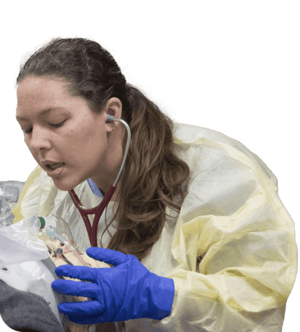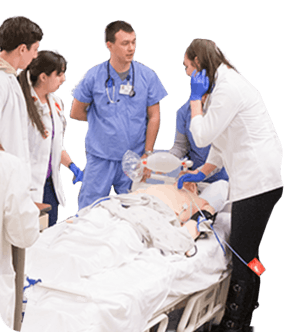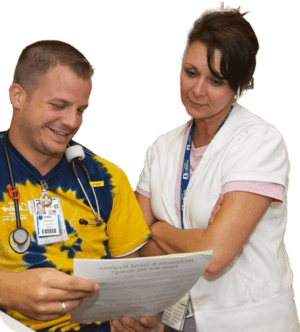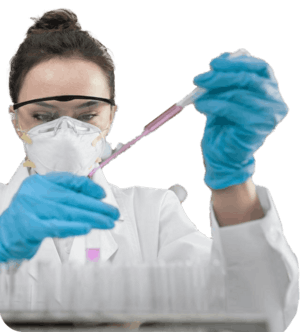Pediatric Residency Program Curriculum
With more than a million patient visits each year, our pediatric residents receive a well-rounded experience in the field of pediatrics. The goals of the pediatric rotation curriculum are to provide program residents with:
- Diverse clinical and educational experiences that enable residents to develop clinical expertise in pediatric medicine
- Opportunities that ensure residents understand the medical literature and apply the principles of evidence-based medicine when managing pediatric patients
- Opportunities for pediatric residents to develop and apply research skills to study the causes, treatment and management of childhood illness
- Experiences that allow residents to serve as educators to patients and families, the community and other health care providers
- Mentoring opportunities to help residents develop as lifelong learners
Akron Children’s required pediatric rotations offer a comprehensive curriculum designed to equip residents with essential skills and knowledge that will last the length of the pediatric residency.
Sample schedules:
PL-3
| Block | 1 | 2 | 3 | 4 | 5 | 6 | 7 | 8 | 9 | 10 | 11 | 12 | 13 |
| Rotation | Elective | PICU | Elective | Psych | Elective | Elective | Inpatient Floor Team |
Elective | Emergency Medicine |
Elective | Inpatient Floor Team |
Elective | Board Review |
PL-2
| Block | 1 | 2 | 3 | 4 | 5 | 6 | 7 | 8 | 9 | 10 | 11 | 12 | 13 |
| Rotation |
Inpatient |
Hematology -Oncology |
Dev/Beh Peds |
Inpatient Floor Team |
Elective | Emergency Medicine |
Ambulatory | PICU | Elective | Inpatient Floor Team |
Elective | Elective | NICU |
PL-1
| Block | 1 | 2 | 3 | 4 | 5 | 6 | 7 | 8 | 9 | 10 | 11 | 12 | 13 |
| Rotation | NICU | Inpatient Floor Team |
Emergency Medicine |
Elective | Adolescent Medicine |
Inpatient Floor Team |
Elective | Advocacy | Inpatient Floor Team |
Newborn | Inpatient Floor Team |
Elective | Inpatient Floor Team |
Ambulatory Care Residency Electives:
- Advanced Adolescent
- Advanced Community Advocacy
- Advanced Development
- Amish Health and Ambulatory Genetics at the New Leaf Clinic (rural rotation)
- Fast Track: PEM
- Healthy Active Living
- Locust Pediatrics (urban rotation: underserved population, including refugees and children in foster care)
- Rural rotation
Subspecialty Medical Electives
- Allergy-Immunology
- Anesthesiology/Procedural Sedation
- Cardiology
- Dermatology
- Endocrinology
- Gastroenterology
- Genetics
- Infectious Disease
- Nephrology
- Neurology
- Palliative Care
- Pharmacology/Toxicology
- Pulmonology
- Radiology
- Rehabilitation
- Rheumatology
- Sports Medicine
Other Medical Subspecialty Electives
- Advanced elective in any pediatric medical subspecialty
- Advanced Newborn
- Bone Marrow Transplantation
- Cardiac Imaging
- Hematopathology
- NICU: Advanced: PL 2
- NICU: Community based at Mercy Health – St. Elizabeth Boardman Hospital: PL 3
- NICU: Introduction to NICU: PL 1
- PICU: Advanced: PL 3
- PICU: Introduction to PICU: PL 1
Hospital Medicine Electives
- Hospital Medicine, Akron Children’s Hospital, main Akron campus
- Hospital Medicine, Community-Based at Akron Children’s Beeghly or at Wooster Community Hospital
Pediatric Surgery Residency Program Electives
- Cardiothoracic Surgery
- Dentistry
- ENT
- General Surgery
- Neurosurgery
- Ophthalmology
- Orthopedic Surgery
- Neurosurgery
- Urology
Other Pediatric Rotation Electives
- Administrative Leadership
- Bioethics
- Domestic: Away rotation in the U.S.
- Global Health: International
- Informatics
- Lactation
- Parenting
- Procedures
- Professional Development
- Quality Improvement
- Research
- Teaching
The goal of the community health clinical rotation is to provide a rich, community-based experience in which the pediatric resident:
- Identifies community-based organizations involved in supporting the optimal growth and development of children and families in our region
- Engages with community so that the resident and agencies can properly advocate for children
- Develops insight into the principles of the patient-centered medical home
- Develops an understanding of the unique and complex circumstances of children with special health care needs
- Develops an understanding of the social determinants of health, including the effects poverty, housing, income and toxic stress have on child development and health
- Participates in small group discussions with faculty about diversity, racism and social determinants of health
Community Advocacy Rotation Overview
- Full-day experiences
- New Leaf Center: Serves the Amish population
- Locust Pediatrics: Serves our refugee population
- Dental Clinic
- CARE Center: Child abuse center
- School Health in the Akron Public Schools
- Reach Out and Read program
- Half-day experiences
- Bridges Out of Poverty – virtual
- Legal aid session with Akron Children’s legal aid lawyer
- Lead Clinic, Locust Pediatrics
- Family Child Learning Center
- Seasonal experience
- Hartville Migrant Ministry Medical Clinic with Akron Children’s pediatricians
- Independent scheduling – virtual
- WIC
- Help Me Grow/Early Intervention
Advanced Community Advocacy Elective
- Completing the AAP Advocacy Training Modules
- Contacting federal legislators on a child health issue, based on your interests, through the AAP
- Submitting a one-paragraph update on two different advocacy topics of your choice. These updates will be included in the residency program’s Weekly Wednesday emails to educate residents in the program about advocacy.
- Highly recommended: Select an advocacy issue to work on as your required residency QI project.
Clinical Requirements for the Advanced Community Advocacy Elective
- The pediatric resident must choose and attend six half-day sessions from the following areas during the rotation:
- SDH: Healthy Weight Clinic
- SDH: Care Center
- SDH: Addiction Medicine
- SDH: Lead Clinic, Locust
- SDH: Dental Clinic
- SDH: Mental Health: Work with the LISW Social Workers in the BHU in the ED
- SDH: Locust Pediatrics or ACHP East: working with the underserved and refugee/immigrant population
- Population Health: Work with the Case Manager in the ED
Adolescent Medicine Rotations
- Interns get the opportunity to work in the Center for Gender Affirming Medicine for transgender and LGBTQ+ youth during this rotation.
- The Center’s team includes gender-affirming physicians, medical assistants, social workers, nurse coordinators, mental health therapists and endocrinologists.
- Residents who wish to spend more time in the Center can choose to do an Advanced Adolescent Medicine rotation.
Social Determinants of Health
- Resident Health Equity Curriculum: During Noon Conferences
- Overview on the Social Determinants of Health and Workshop on Food Insecurity: Intern session
- Transportation Barriers: Intern session
- Health Care Treatment Costs/Cost Effective Care: Sessions occur annually
Hospital-Supported Community Events and Programs
- Read to Me Day
- Akron Children’s pays your registration fee for the Akron Marathon
- Akron-Canton Regional Foodbank at Akron Children’s
- Annual Have a Heart Do Your Part Radiothon
- Harvest for Hunger Program
- Annual Kids are #1 Run
Pediatric Global Health Residency: Dominican Republic at the Oscar de la Renta Pediatric Center
- Managed in partnership with the Edward Via College of Osteopathic Medicine (VCOM), Dominican Republic Ministry of Public Health, Servicio Nacional de Salud, Akron Children’s Hospital and Grupo Puntacana Foundation
- Serves a population of more than 15,000 children living in the underserved communities in and around Veron Punta Cana
- Services are rendered free of charge, with a modest fee for laboratory services
- The facility diagnoses and treats common illnesses, offers regular checkups and immunizations, take X-rays and scans, and tracks children’s growth progress.
- Residents work in an ambulatory pediatric clinic.
- Safe lodging for residents in a suburb in Punta Cana
- Safe transportation:
- To and from the airport to lodging
- To and from lodging to the clinic
- To and from the Westin Hotel in Punta Cana, which is on the beach: Residents can use the hotel’s facilities
Global Health Partnership with NEOMED for Residents
- Clinical experiences and rotations
- Work with our medical team at one of our academic partner institutions in India and Nepal.
- Community health in remote settings
- Work with health program teams to improve healthcare in poor, disadvantaged and remote communities in India and Nepal.
- Global research and innovation
- Work with NEOMED and international researchers or team up with innovators at the Nepal and India innovation centers and help solve medical challenges.
NICUs Where Our Pediatric Residents Rotate
- Akron Children’s NICU, main Akron campus: Level 4 NICU
- Faculty: Akron Children’s Neonatologists
- No on-site deliveries
- 75 beds
- Akron Children’s NICU at Summa Health, Akron: Level 3 NICU
- 5 miles from Akron Children’s Hospital, main Akron campus
- Faculty: Akron Children’s Neonatologists
- On-site deliveries
- 22 beds
- Akron Children’s NICU at St. Elizabeth, Boardman: Level 3 NICU
- One hour away from Akron Children’s Hospital, main Akron campus
- Faculty: Akron Children’s Neonatologists
- On-site deliveries
- Elective site for those residents interested in becoming neonatologists
- 25 beds
Intern NICU Residency Program Required PL 1 Rotation
- Two-week PL 1 rotation (one week at Akron campus; one week at Summa Health)
- Work 6 a.m.-4 p.m. M-F and two weekend mornings per month
- There is no overnight coverage required
PL 2 NICU Residency Program Required Rotation July 2025-2026
- PL 2s will rotate at Akron Children’s NICU at Summa Health, Akron.
- 1-2 weeks: Total of six shifts; 12-hour day shifts for rounds and deliveries
- 1-3 weeks: Total of six shifts; 12-hour night shifts for admissions, consults and deliveries
- No weekends or holidays required
- Goal of more autonomy and less “learner competition” for delivery experience
Delivery Experience
- Pediatric Residents who are interested in NICU can do:
- Introduction to NICU: PL 1
- Summa NICU Delivery Experience: PL 2
- Advanced NICU
- Community NICU
- Community-Based Hospital Medicine Rotation: Wooster
Goal of the Quality Improvement Training for Health Care Professionals
- Residents will be able to discuss QI methodology by actively participating in group QI projects.
- Quality improvement projects for residents expose them to multidisciplinary work groups, hospital logistics and presentation skills, along with QI methodology.
QI Project Requirements
- All residents are required to be actively involved in a QI project each academic year with an aim statement, key driver diagram, collection of data and completion of at least one PDSA cycle per academic year.
- Residents present their QI projects each fall and spring during Noon Conference and turn in group summary and individual reflection.
- Three didactic Noon Conference sessions/year (one for interns only and two for all residents)
- Two Noon Conference sessions that are broken into smaller groups to share progress and learning
- Friday Noon Conference time is available for QI group work (as requested by residents) with support from quality services to help with their QI projects during this time
- Residents complete two or three online IHI Open School modules each year (different for each academic year).
Residency QI Committee
- QI Residency Leadership Team: Dr. Samantha Gunkelman, Dr. Hannah Elkus and a designated chief resident
- Dr. Gunkelman and the designated chief resident serve as representatives from the residency program to the Hospital-Based Care QAPI.
- Assistance from Akron Children’s Quality Services:
- Gives didactic presentations to the residents on QI
- Provides support to the residents at group QI work sessions at Noon Conferences
- Provides feedback at small group Noon Conference sessions
- Provides feedback with individual group projects as needed
QI Elective
- Elective is offered to senior residents with the expectation that residents will:
- Obtain IHI Open School Basic Certification
- Work on one’s QI group project with time allotted to prepare to present or publish one’s QI Project if desired
- Implement QI methodology in one’s QI project (pareto charts, control charts, process mapping, FMEA, etc.)
- Participate in Quality Service activities/committees, including attending quality services morning huddle, safety rounds and QI committee meetings
- Much of this work during this elective can be done remotely.
This is a longitudinal 18-month residents-as-teachers curriculum track for second- and third-year residents that begins in January of every academic year.
- It is administrated by the chief residents.
- Residents receive six foundational lectures on medical education topics from faculty and the chief residents.
- Each resident in the track is required to give four presentations on pediatric topics to M3 students during their pediatric clerkships.
- There are additional opportunities for mentoring sub-interns.
- Residents complete a curriculum project over the course of the track: can work in pairs or in a group.
- Pediatric residents are required to complete a teaching elective in their PL 3 year and enroll in our program’s Residents as Teachers Track (RAT Tract).
Purpose of the Simulation Curriculum
- Prepare interns entering our program for their clinical roles
- Enable residents to learn procedures in a safe environment
- Enable residents to work as team members and team leaders during resuscitations
- Enable residents to apply NRP principles at deliveries in order to effectively and efficiently resuscitate newborns
- Prepare residents to deliver difficult news to patients and their families
- Ensure that residents can perform LPs and effectively BVM patients who are in respiratory failure
Resident Simulation Curriculum
- Intern boot camp
- Term Newborn (TN) and PEM Simulation Curriculum
- NICU simulation curriculum
- Mastery training
- Procedures
- In-situ multidisciplinary simulations
Mandatory Intern Orientation
Starts after June 15 annually. Intern attendance is required.
- PALS and NRP courses
- EPIC training
- Intern “boot camp”
- 2.5 days of multidisciplinary and multimodal simulation at the Simulation Center
- Simulators
- Standardized patients
- Didactics
- Procedural skills stations
- 2.5 days of multidisciplinary and multimodal simulation at the Simulation Center
Longitudinal Simulation Curriculum – TN/PEM
Participants
- PGY-1 on their TN rotation
- All residents during their PEM rotations
Schedule during the four-week block
- Three Friday sessions with the simulation team
- One Friday session with the Palliative Care team on “Breaking Bad News”
Each four-hour session is on Friday afternoons
- Procedural skills for two hours
- Team-based simulation case for two hours
NICU Simulation Curriculum
Participants
- Interns and PL 2 residents on their NICU rotations
Schedule
- Four Fridays during the block
Sessions
- Three one-hour: Low-fidelity NRP (delivery) simulations
- One four-hour: High-fidelity simulation with procedural skills training
Cases
- PPV/CPAP, MR SOPA
- Decision to Intubate
- Decision to Start Chest Compressions
- Premature Infant Considerations
Procedures
- Warmer Set-Up: Neo-Puff
- PPV/Intubation
- Emergent UVC
- Thoracentesis
Mastery Training
- Rising PGY-2 and PGY-3s demonstrate mastery at LP and BVM prior to start of next academic year
- Combined with Just-In-Time Training
In-SITU Mock Codes
- Seventy-nine hospital mock codes were held in 2022; 49 in 2021; 79 in 2020
- Multidisciplinary Health Care Team, including residents













